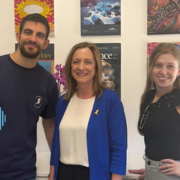Meet Our New Faculty
Learn more about new faculty members
Dr. Bruria Adini is the new head of the Emergency Management & Disaster Medicine department of the School of Public Health. Dr. Adini completed her PhD (cum laude) in the Health Systems Management department in the Ben-Gurion University of the Negev. As part of her dissertation she developed a model to evaluate the levels of emergency preparedness of hospitals, that has been used in the past decade by the Ministry of Health to evaluate on a continuous basis the preparedness of the healthcare system to all potential risks. Dr. Adini led on behalf of the Ministry of Health in collaboration with the World Health Organization varied training programs, in Israel and abroad, targeted at developing and promoting readiness for emergencies and competencies of first responders and managerial officials to manage disasters. Dr. Adini researches diverse aspects of emergency preparedness and management including advanced methodologies to evaluate emergency preparedness, cross-border management of disasters, effectiveness of training methodologies to build and sustain knowledge, and use of social media during disasters to communicate between the first responders and the public. Dr. Adini published over 45 articles in leading peer-review journals. She is a board member of the World Association of Disaster and Emergency Medicine (WADEM), the Local Authorities Confronting Disasters and Emergencies (LACDE) and the National Council of Trauma and Emergency Medicine
Prof. Liat Lerner-Geva is a full professor at the School of Public Health. Prof. Lerner Geva is a board-certified physician (MD) in Epidemiology and Public Health and has a PhD in Epidemiology, both from the Faculty of Medicine, Tel Aviv University. Since 1997, Prof. Lerner Geva is a faculty member at the Department of Epidemiology and since 2017 she is a full professor at the School of Public Health. Since 2001, she was the director of the Women and Children's Health Research Unit at the Gertner Institute for Epidemiology and Health Policy Research (Ltd), Tel Hashomer Her research agenda is focused on women and children's health with special emphasis on reproductive epidemiology in multi-center and national studies. Prof. Lerner Geva investigates the long term effects of exposure to assisted reproductive technologies in women and children following these treatments. Prof. Lerner Geva is the founder and director of the national registry for in-vitro fertilization (IVF) treatments in Israel.
Dr. Yftach Gepner is a new faculty member in the School of Public Health of the Sackler Faculty of Medicine, and is affiliated with the new Sylvan Adams Sports Institute at Tel Aviv University. He is a graduate of Ben-Gurion University's School of Public Health. His PhD thesis established the role of a combined low-carbohydrate/Mediterranean or low-fat diet, with or without physical activity on various body fat depots. He then continued his training in the Department of Sport and Exercise at the University of Central Florida, to better understand the field of exercise physiology in both applied and basic areas of nature. His research focuses on better understanding the extent, intensity, and type of exercise needed to improve performance and health under a wide range of clinical conditions in a personal manner using cutting-edge technologies, including magnetic resonance imaging (MRI) for assessing muscle damage and adipose tissue distribution, as well as markers of cardiometabolic health. Dr. Gepner has published over 30 peer-review articles that were cited nearly 450 times.
Prof. Elhanan Borenstein holds a joint position at the Department of Clinical Microbiology and Immunology at the Sackler Faculty of Medicine and the School of Computer Science. He received his PhD in computer science from Tel Aviv University (Ruppin's lab), and later held a joint postdoctoral position at the Department of Biology in Stanford University and at the Santa Fe Institute – a think tank for complex systems science. In 2010, he joined the Department of Genome Sciences at the University of Washington (with an adjunct position in the Department of Computer Science and Engineering) as an Assistant Professor, and was promoted to Associate Professor in 2014. He is also an External Professor at the Santa Fe Institute, and has extensive experience in the hi-tech industry. He is the recipient of various awards including the Alfred P. Sloan Fellowship and the prestigious NIH New Innovator Award. Prof. Borenstein focuses on a computational study of the human microbiome, spearheading research in microbiome systems biology, modeling, and design. His lab develops computational methods inspired by metabolic modeling, data science, machine learning, and network theory to model the microbiome and to analyze high-dimensional multi-omic microbiome data. His research ultimately aims to provide a systems-based understanding of the microbiome in health and in disease and to inform microbiome-based therapy.
Dr. Asaf Madi is a new faculty member in the Department of Pathology at the Sackler Faculty of Medicine and is an affiliated member of the Edmond J. Safra Center. Dr. Madi completed his PhD studies at Tel Aviv University in collaboration with the Weizmann Institute under the supervision of the late Prof. Ben-Jacob and Prof. Cohen, and then did a short postdoc at Prof. Friedman's lab at the Weizmann Institute. His studies focused on antibody and T cell receptor (TCR) repertoire analysis. He then continued as a postdoc at the Harvard Medical School working with Profs. Kuchroo and Regev on cancer immunology and T cell differentiation, with a focus on uncovering the molecular circuits controlling T cell exhaustion. Dr. Madi's current research interest lies in understanding the molecular signaling that occurs following immune cell interactions or immunotherapies within the tumor micro-environment. He will utilize single cell proteomic and transcriptomic technologies together with in vitro and in vivo experimental models hand in hand with advanced computational methods. This will hopefully lead to the identification of novel immune related pathways and therapeutic targets.
Dr. Avraham Ashkenazi is a new faculty member at the Department of Cell and Developmental Biology at the Sackler Faculty of Medicine and a member of the Sagol School of Neuroscience. He is also the co-director of the BioMed@TAU Research Hub Disorders of the Mind and Brain. Dr. Ashkenazi completed his PhD studies at the Weizmann Institute of Science under the supervision of Prof. Yechiel Shai. He then joined the lab of Prof. David Rubinsztein at the University of Cambridge as a postdoctoral fellow investigating autophagy and neurodegeneration. Dr. Ashkenazi’s lab utilizes state-of-the-art technologies to elucidate cellular mechanisms of neurological disorders. Some of these disorders progress late in life, such as Huntington's disease and Parkinson's disease. A common characteristic in these disorders is the accumulation of proteins that are not folded properly and can form aggregates in cells. Research in his lab is currently focused on the ubiquitin-proteasome and autophagy pathways, the main routes by which aggregate-prone proteins are degraded. Also, these pathways are important for cells to cope with various stress conditions. This research will elucidate novel regulatory pathways of protein homeostasis in cells to better understand the basis of these devastating diseases and to identify future therapeutic targets.
Dr. Israel Halperin is a new faculty member at the School of Public Health at the Sackler Faculty of Medicine, and the Sylvan Adams Sport Institute. Dr. Halperin completed his PhD studies in Edith-Cowan University, Australia, in collaboration with the Australian Institute of Sport under the supervision of Prof. Chris Abbiss. He then completed a postdoc at Prof. David Behm’s laboratory at Memorial University in Newfoundland, Canada. His studies focused on augmented feedback as a tool to improve skill learning and athletic performance. Dr. Halperin is currently developing and fine-tuning coaching strategies that improve motor learning, physical performance, and motivation to exercise. He takes a particular interest in the following interventions: directing one’s attention to a particular aspect of a motor task; self-observation techniques, including mirrors and videos of task execution; and the restructuring of training and rehabilitation programs in view of patient and athlete preferences. In addition to the applied research components, Dr. Halperin aims to develop a richer understanding of the underpinning mechanisms accounting for the effects using electromyography, interpolated twitch technique, eye trackers, and more. In doing so, he hopes to improve athletic performance on the one hand, and rehabilitation and injury prevention programs, on the other.





